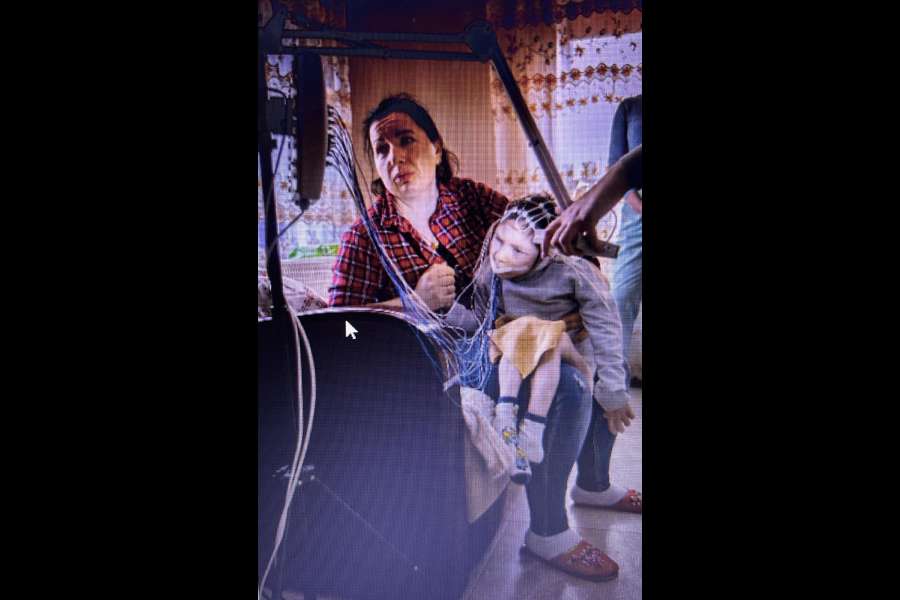In more than three years of full-scale war, Ukrainian families of children with long-term illness have had to overcome countless challenges.
In Kharkiv, a city Russia has bombarded repeatedly, an outreach team from Children’s Hospital No. 5 helps children like Mykyta Hvozdev, 9, who lives with cerebral palsy and other health problems.
Mykyta receives physical therapy in the fifth-floor flat he shares with his mother, Olha Aloshkina. She has to carry him up and down the stairs.This flat was what she and Mykyta could borrow, Aloshkina says, to get out of Saltivka, a neighbourhood battered by Russian assaults. Mykyta, who has little vision but acute hearing, struggled with the sounds of bombardment there. During loud attacks, she says, she puts blankets on the windows and blasts music or cartoons, to protect him from stress.
Aloshkina, 47, is raising Mykyta alone. Each morning, she grinds up the medicines he needs in his breakfast.
The war scattered medics and specialists.
So in 2023, when Oksana Lytvynova noticed a lump on the shoulder of her son Nikita Horodniuk, she says he received a misdiagnosis that led to radiation treatment rather than immediate chemotherapy. By last year, when Nikita was 7, the cancer had spread to his bones and blood.
He came to Kyiv for chemotherapy at Ohmatdyt hospital, surviving a Russian strike there last July, but eventually went into palliative care. He died last month.
For people like Danyl Dron, 19, the power outages that became common when Russia started targeting electrical infrastructure could also be deadly.
His health has been deteriorating since he was diagnosed with a brain tumour as a toddler. For a decade, machines have helped him breathe.
His mother, Olena, cares for him at home in the Dnipro region. The family relies on a large solar panel donated through a charity, Tabletochki.
Valentyna Mykhtarova says it took years of effort to get the help her son Matvii Mukhtarov, 4, needed.
He was diagnosed with neurofibromatosis, in which tumours grow along the nerves, late in 2022, shortly after his father, Denys Mukhtarov, died in combat.
Matvii had surgery last March, but shelling kept him from another operation, Mykhtarova says, and she fears returning to the regional clinic in Kharkiv while fighting is nearby.
Liubov Kovalova, now 10, returned to the Donbas region six weeks before the full-scale invasion, after 27 sessions of radiotherapy for a slow-growing brain tumour, her mother, Maryna Kovalova, recalls. She then endured three months of chemotherapy.
For over a year, the family stayed in the Donbas, coping with evacuations and pharmacy closures. But last August, Russian advances forced a move to central Ukraine.
Roman Ohurtsov, now 7, was also living in the east when he was diagnosed with acute lymphoblastic leukemia. It was only the latest in a series of blows to the family, his father, Viktor Ohurtsov, 46, explains.
His elder son, who had gone off to fight, sustained heavy wounds to both legs from an artillery shell. Two weeks later, Ohurtsov’s wife died from a stroke. Roman fell ill soon after. The psychological effects of war cut deep for young people. Polina Usapashvili, 14, struggles to continue as she recounts the violence she has witnessed.
She is back in Lozova, her hometown in the Kharkiv region, from which she was evacuated in the first months of the war. But she is suffering from Bell’s palsy and worsening psoriasis, and she has sought help for depression. Her family cannot afford the in-person psychiatric sessions she has asked for.
War trauma had an even deeper impact on Viktoria Vozniuk, 11. She and her mother, Larysa, 51, spent hungry months hiding in a basement as battle raged in Kreminna, in the Luhansk region.
New York Times News Service










